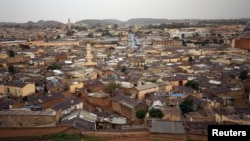Human rights experts warn Eritrea maintains an iron grip on its people through repression and widespread, systematic impunity for grave human rights violations.
At the U.N. Human Rights Council Wednesday, the experts presented what they call “credible reports” of grave human rights violations by the Eritrean ruling elite.
“The state of human rights in Eritrea continues to be dire with no signs of improvement,” said Ilze Brand-Kehris, assistant secretary general of the U.N. Office of the High Commissioner for Human Rights.
She said her office continues to receive credible reports of torture, arbitrary detention, enforced disappearances, and restrictions of the rights to freedom of expression, association, and peaceful assembly.
“Impunity persists for these egregious human rights violations,” she said.
She accused the government of silencing dissenting voices through systematic repression and the detentions or enforced disappearance of “thousands of religious leaders, activists, journalists, and those evading mandatory and indefinite military service.”
The U.N. special rapporteur on Eritrea, Mohamed Abdelsalam Babiker, told delegates attending the council session that there was no evidence the government has taken any steps “to prevent, investigate or redress the grave human rights violations” documented by a variety of monitoring groups.
“The complete lack of action by Eritrean authorities over the last two decades to address their country’s troubling human rights situation is a matter of governmental policy.”
He said, “The prevailing impunity has enabled the recurrence of human rights violations and silenced the victims. The identified practices and patterns of gross violations continue unabated.”
In response to the criticisms of his country, the charge d’affaires of the permanent Mission of Eritrea in Geneva, Habtom Zerai Ghirmai, accused those testifying at the council of presenting baseless, unfounded allegations.
He said Eritrea has been a victim of politicized and selective mandate for the last 12 years. Rather than being a violator of human rights, he said, “Our commitment to the promotion and protection of human rights lies at the heart of our nationhood, a nationhood that was realized after a long drawn armed struggle for the human rights of the Eritrean people.”
U.N. rapporteur Babiker said Eritreans have been stripped of their civic rights, noting that no elections have been held in over 30 years. “Eritreans do not have any avenues to participate in decision-making in their own country…No political groups are allowed to organize outside the ruling party, and independent media and civil society are not allowed to operate.”
Additionally, he said no action has been taken to reform Eritrea’s compulsory national service. Because of the country’s indefinite military service, he said Eritreans continue to be subjected to gross and horrific abuse, including forced labor and sexual violence.
“I routinely receive information regarding individuals who have been conscripted for the past 20 years, who have been deprived of their civic, social, and economic rights including the right to work, the right to life, family life, freedom of movement and the right to education. Further, severe, and collective punishments are inflicted on draft evaders, their families, and their communities,” he said.
As of June 2023, the U.N. refugee agency, UNHCR, says Eritrea’s indefinite national service had driven an estimated 345,000 Eritrean refugees and asylum seekers to flee the country. This out of a global number of more than 580,000 Eritreans who have sought safety abroad.
“Eritrea suffers from an acute lack of rule of law with no independent judiciary or other accountability mechanisms,” observed Assistant Secretary-General Brands-Kehris, noting that Eritrea has not enacted any legal reforms that could foster the promotion and protection of human rights.
“Impunity abounds for violations of international human rights law and international humanitarian law, including those committed in the context of the Tigray conflict by Eritrean Defense Forces or EDF,” she said.
Despite an agreement signed by Eritrea to withdraw its forces from Ethiopia, Brands-Kehris said, “Our office has credible information that the EDF remains in Tigray and continues to commit cross-border violations, namely abductions, rape, looting of property, arbitrary arrest and other violations of physical integrity,” she said.
Civil Society Representative Hanna Petros Solomon has a harsh perspective of life under Eritrea’s repressive regime. “I am a child of heroes who served their country honorably and yet now languish in solitary confinement.”
She said her father, Petros Solomon, played a prominent role during the struggle for independence and post-independent Eritrea, as did her mother, Aster Yohannes.
“The last I have seen or heard of my father was the morning of September 18, 2001, 22 years ago. The last I have seen or heard of my mother was December 11, 2003, 20 years ago.
“They have not committed any crime to warrant such punishment. They have not been convicted or sentenced in a court of law,” she said.
“The U.N. considers it torture, inhuman and degrading to hold a prisoner in indefinite or prolonged solitary confinement for over 15 days,” she said. “My parents’ indefinite solitary confinement has now stretched to over two decades.”





